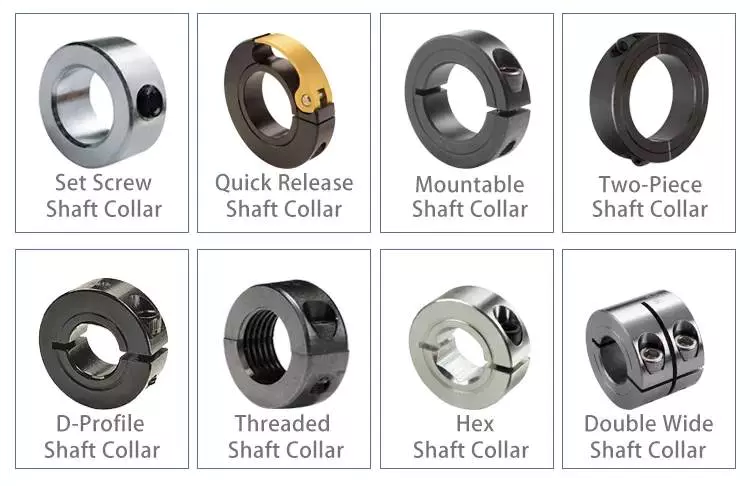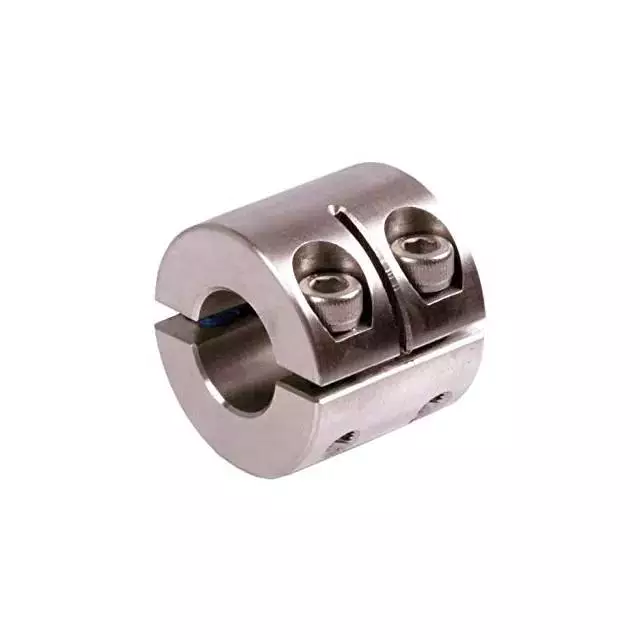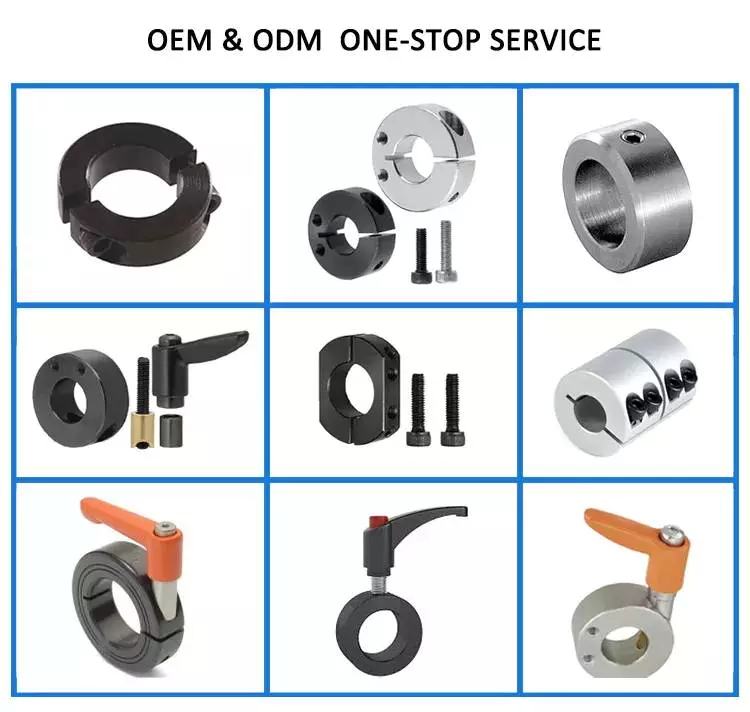Product Description
Product Description
CUSTOM DESIGNS
As a service to our customers, we offer our vast manufacturing experience and talents to meet special needs with custom parts. our in-house engineering team has extensive experience designing and custom engineering solutions to meet your requirements. if you do not see what you are looking for in our standard line, please inquire about custom options.
we manufacture shaft collars in 12L15 lead-free steel with a zinc or proprietary black oxide finish, 303 and 316 stainless steel, high-strength 2571 aluminum, and engineered plastic. Bore sizes range from 1/8″ to 6″ and 3mm to 150mm.ONE-PIE
1.materials:stainless steel,alloy steel ,aluminum ,brass etc.
2.Finish: Zinc plating, Nickel plating,nature
3.competitive price ,prompt delivery
4.OEM service as your drawings
Technics
1.Milling 2.grinding 3.Turning 4.wire-cutting 5.CNC bending 6.CNC machining 7.Stamping 8.forging 9.boring 10.broaching and so on .
Accuracy
1.Milling:0.01mm 2.Turning:0.01mm 3.Grinding:0.002mm 4.Wire-cutting :0.005mm 5.CNC Machining : 0.005mm
Company Profile
RunCheng Import and Export Co., Ltd is the leading professional OEM/ODM manufactory of auto parts, hardware, graphite products, sanitary ware and mechanical items. Product ranges include CNC machining parts, casting parts, stamping parts, forged parts, turning parts, pipe fitting, rubber parts, CZPT and many more.
We ensure the highest quality by using only the highest quality raw materials and by subjecting all our products to a rigorous Quality Control System. The quality control of our large-scale production process conforms to ISO9001 standards.
We have won the trust of our clients with our top quality products and outstanding service.
Our business is built on the following 4 advantages, namely Full range of products, Top quality, Outstanding service and Reasonable price!
Contact us at once and let′ S do mutually beneficial business together!
Production ability
|
EQUIPMENT LIST |
||||
|
NAME
|
SPECIFICATION |
BRAND |
ORIGINAL PLACE |
QUANTITY |
|
CNC Machines |
Graph 600 |
KNUTH |
CHINA |
20 |
|
1370 |
KAFO |
TAPAN |
20 |
|
|
EDM Machines |
ZNC450 |
BHangZhouNA |
ZheJiang |
20 |
|
ZNC430 |
BHangZhouNA |
ZheJiang |
30 |
|
|
Grinding Machines |
ACC-350ST |
BESFORD |
CHINA |
50 |
|
Auto Lathe Machining |
L150G-II |
OKUMA |
CHINA |
80 |
|
Wire Cutting Machines |
DK7732 |
NEW FAST |
CHNA |
30 |
|
Milling Machine |
SHCM-97A |
GENTIGER |
ZheJiang |
20 |
|
CMM Machine |
CRT-PA574 |
MITUTYO |
JAPAN |
10 |
|
Hardness Tester |
TILO-T60 |
MITUTYO |
JAPAN |
5 |
Productions showing:
Equipments & Working plant:
Worry about our quality problem?
We are an IATF16949:2016 Certifed supplier, strictly execute inspection on ISO quality control system. All our products will pass 10-step inspections: it starts from incoming material inspection to IPQC, then FQC and final inspection with reports before shipment.
Packaging & Shipping
Generally carton or wooden case or plastic foam with standard export wooden pallet , or as per consumer’s requirements.
Certifications:
Your Satisfaction, Our Motivation!
FAQ
Q1. Are you factory or trading company?
A: We are a customized factory with independent oversea trading office .
Q2.Can you provide sample for us?
A: Yes, free sample is available
Q3. What raw material do you use?
A: Stainless Steel, Carbon Steel, Mild Steel, Galvanized Steel, Aluminum alloy, brass, copper, Aluminum etc.
Q4. What finishes can you provide?
A: powder coating, polishing, zinc/nickel /chrome plating, painting, anodized, hot dip galvanized, sandblasted etc.
Q5. How do you ensure quality control?
A: We inspect every process based on your drawings or samples and also check the products before packing
Q6. Is small quantity available?
A: Yes, Small quantity for trial order is available.
Q7. How do you ship the goods?
A: We have our cooperation forwarder, they can deliver the goods to you in very short time with competitive price, and you can ship by your own agent as your convenience.
Q8. How about your delivery time ?
A: 3-10 days for samples and 15-45 days for mass production .
Q: How To Place A Order?
* You send us drawing or sample
* We make the sample and send it to you
* You think the sample is good then place an order and pay us 30% deposit
* We start to make the product
* When the goods is done, we take photoes for your check and you then pay the balance
* We deliver the products to courier company
| Application: | Auto and Motorcycle Accessory, Machinery Accessory, Transmission |
|---|---|
| Standard: | GB, EN, JIS Code, TEMA, ASME, Customed |
| Surface Treatment: | Anodizing |
| Production Type: | Mass Production |
| Machining Method: | CNC Turning |
| Material: | Nylon, Steel, Plastic, Alloy, Aluminum, Cold Forming Steel |
| Samples: |
US$ 10/Piece
1 Piece(Min.Order) | |
|---|
| Customization: |
Available
| Customized Request |
|---|

Can I find information on alternatives to traditional shaft collars for specific applications?
Yes, information on alternatives to traditional shaft collars for specific applications is available. In addition to traditional shaft collars, there are various innovative solutions and alternative devices that can be used depending on the specific application requirements. Here are some sources where you can find information on alternatives to traditional shaft collars:
- Manufacturer Websites and Catalogs: Many manufacturers of mechanical components provide detailed information on their websites or in product catalogs about alternative devices or solutions to traditional shaft collars. These resources often highlight specific applications, industries, or challenges where alternative devices may be more suitable. Exploring manufacturer websites and requesting catalogs can help you discover innovative options.
- Technical Publications and Journals: Technical publications and journals focused on mechanical engineering, automation, or industrial applications often feature articles or case studies discussing alternative devices for various applications. These resources provide insights into the latest advancements and emerging technologies in the field. Accessing academic databases, engineering libraries, or subscribing to relevant publications can help you access this information.
- Engineering Conferences and Seminars: Attending engineering conferences, seminars, or workshops related to mechanical components or industrial automation can provide opportunities to learn about alternative devices through presentations, panel discussions, or technical sessions. These events often bring together experts, researchers, and industry professionals who share their knowledge and present innovative solutions. Checking event calendars, industry association websites, or engineering organizations can help you find relevant conferences or seminars.
- Online Engineering Forums and Communities: Online engineering forums, communities, and social media groups dedicated to mechanical engineering or industrial automation can be valuable sources of information on alternative devices. These platforms allow engineers and professionals to exchange ideas, discuss challenges, and share their experiences with different solutions. Participating in these forums, asking questions, or searching for relevant discussions can provide insights into alternative devices for specific applications.
- Consulting with Industry Experts: Seeking advice from industry experts, such as mechanical engineers, industrial automation specialists, or application consultants, can help you explore alternative devices tailored to your specific application requirements. These professionals have in-depth knowledge of the field and can provide personalized recommendations based on your needs. They can be contacted through engineering consulting firms, professional networks, or by reaching out to manufacturers directly.
When considering alternatives to traditional shaft collars, it is important to thoroughly evaluate the specific application requirements, including factors such as load capacity, precision, environmental conditions, space limitations, and maintenance considerations. Each alternative device may have its own advantages and limitations, and it is crucial to select the most suitable option based on the unique needs of your application.

Where can I find information on the materials used in manufacturing shaft collars?
If you are looking for information on the materials used in manufacturing shaft collars, there are several sources where you can find relevant information. Here are some common resources to consider:
- Manufacturer Websites: Many manufacturers of shaft collars provide detailed information about the materials they use in their product specifications or technical datasheets. Visiting the websites of specific collar manufacturers and exploring their product documentation or resources section can help you find information about the materials used in their collars. This information may include the type of material (such as steel, stainless steel, aluminum, or plastic) and any specific properties or characteristics associated with the material.
- Product Catalogs and Brochures: Manufacturers often publish product catalogs or brochures that provide an overview of their collar offerings. These catalogs may include information about the materials used in manufacturing the collars. You can request catalogs from manufacturers directly or check their websites for downloadable versions. The catalogs may highlight the material properties and advantages of using specific materials for different applications.
- Material Databases: Online material databases or directories can be valuable resources for finding information about specific materials used in manufacturing shaft collars. These databases typically provide comprehensive information about various materials, including their composition, mechanical properties, corrosion resistance, temperature tolerance, and other relevant characteristics. Examples of such databases include MatWeb, Engineering Toolbox, or specialized materials databases maintained by industry organizations or universities.
- Technical Standards and Specifications: Technical standards and specifications related to mechanical components can often include information about the materials used in their construction. Standards organizations or industry associations may release documents that outline the material requirements for shaft collars or provide guidelines for material selection. Accessing these standards or specifications can provide insights into the recommended materials for shaft collar manufacturing.
- Consulting with Manufacturers or Suppliers: If you have specific questions about the materials used in manufacturing shaft collars, reaching out directly to manufacturers or suppliers can be beneficial. They can provide detailed information about the materials they use, including their composition, properties, and any specific treatments or coatings applied to enhance performance. Contacting manufacturers or suppliers allows for direct communication and the opportunity to address any specific concerns or requirements you may have.
When seeking information on materials used in shaft collar manufacturing, it is important to consider factors such as desired properties (e.g., strength, corrosion resistance), environmental compatibility, and application-specific requirements. This will help you make informed decisions about selecting shaft collars that are suitable for your specific needs and operating conditions.

What are the different types of shaft collars available in the market?
In the market, there are various types of shaft collars available, each designed to meet specific application requirements. Here are some commonly used types of shaft collars:
- Set Screw Shaft Collars: Set screw shaft collars are the most common type and feature one or more set screws that tighten against the shaft to secure the collar in place. These collars have a simple design and are available in various materials such as steel, stainless steel, or aluminum. Set screw collars are easy to install and provide a reliable grip on the shaft.
- Clamping Shaft Collars: Clamping shaft collars use a clamping mechanism, such as a split design with two halves and bolts, to tighten around the shaft. They provide a strong and secure grip and are often used in applications where frequent adjustments or repositioning of the collar is required. Clamping collars are available in different materials and can provide excellent holding power.
- One-Piece Solid Shaft Collars: One-piece solid shaft collars are made from a single piece of material, typically metal, and have no moving parts. They are simple in design and provide a lightweight and compact solution for applications where space is limited. These collars are often used in light-duty applications or as a stop or spacer on a shaft.
- Two-Piece Split Shaft Collars: Two-piece split shaft collars consist of two halves that can be assembled and tightened around the shaft using screws or bolts. This design allows for easy installation and removal without the need to slide the collar along the shaft. Two-piece split collars are commonly used in applications where the shaft cannot be easily disassembled or where frequent adjustments are required.
- Threaded Shaft Collars: Threaded shaft collars have internal threads that allow them to be screwed onto a shaft. They provide a secure and adjustable grip when tightened against the shaft. Threaded collars are often used in applications where precise positioning or fine adjustment is needed.
- Hinged Shaft Collars: Hinged shaft collars feature a hinge mechanism that allows for easy installation and removal without completely disassembling the collar. They are often used in applications where frequent access to the shaft is required or when the collar needs to be quickly repositioned or replaced.
- Flanged Shaft Collars: Flanged shaft collars have an extended flange on one side, which provides additional support and acts as a stopping point for other components. The flange helps prevent axial movement of the collar and provides a reference surface for locating or positioning other elements, such as bearings, gears, or pulleys.
- Specialty Shaft Collars: In addition to the standard types mentioned above, there are specialized shaft collars designed for specific applications. These include torque-limiting collars, indexing collars, quick-release collars, and shaft collars with integrated components such as gears or pulleys. These specialty collars cater to specific needs and offer unique features to enhance functionality or simplify assembly.
The choice of shaft collar type depends on factors such as the application requirements, shaft size, load capacity, ease of installation, and adjustability. It’s important to select the appropriate type of shaft collar that best suits your specific application to ensure proper functionality and secure shaft positioning within the mechanical system.


editor by CX 2023-12-14